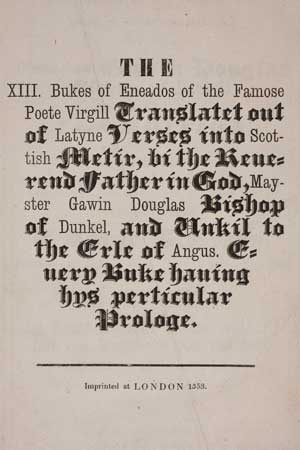Though Gawin Douglas translates each book into Scottish verse, he does not keep to the original line structure of the Latin scripts. Using the original meaning as a guide, Gawin Douglas provides a very liberal translation of the Aeneid in order to fix it into a rhyme appropriate for Middle Scots. Since it is far from a literal translation, the original Latin is not included in this book. It is a celebration of the Scottish language. The title page promises that the book includes an extensive Scottish-English glossary. Sadly no such glossary is included in our copy.

A Middle-Scots version of the Aeneid
In this edition by Gawin Douglas, published in 1610, the Aeneid has been translated from Latin into Middle Scots. Try reading the Middle Scots aloud and finding the similarities to English.
One of the more unique and fragile books in the D.A. Kidd Collection is a copy of Virgil’s Aeneid translated into Middle Scots poetry. This particular text is a second edition published in 1610, which includes a detailed biography of the author Gawin Douglas.
Born some time between 1474-1476, Gawin Douglas was the son of an Earl, and as a result he made several connections that helped him secure a successful political career as Archbishop of Dunkeld from 1516 to 1521. However, before Douglas devoted himself to the public cause, he had studied at St Andrews and then spent time as a young man in Paris, where he completed the majority of his poetic works.
In the biography of Douglas in this edition, praise is given to the orderly social messages within the Aeneid. The biographer notes that Douglas had become a restrained servant of God and was “freed from the tyranny of unreasonable passion” which had seduced him during his youth. Douglas believed passionately in the importance of societal sensibility, and thought that the hope of fortune after adversity as portrayed in the Aeneid could benefit the Scottish people. His dedication to producing a translation meant that this book was the first full and successful example of the Aeneid translated into any English dialect.
The first 12 books of this edition have been translated from the original Latin poetry of Virgil. In addition the 13th book has been translated from the Latin of Maffeo Vegio (1428).

Frontis piece from the 1610 edition of the Aeneid in the Kidd Collection. Acc# 214.13.11, James Logie Memorial Collection.